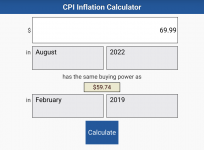Ubisoft will be shifting to a $70 price point for AAA games, according to Ubisoft CEO Yves Guillemot, who was recently interviewed by Axios regarding a range of topics in Paris last week.
Go to post
Go to post
Meh.
They can charge whatever they want to on Day 1. I'll buy a game when it drops to a price I think is worth while.
I'll say this... with Ubisoft in particular at least. They don't code their stuff that well. Like in the latest assassins creed I run a program or engine from CheatHappens. I skill up and enjoy the game and buy all the **** in the game short of whatever the pearls or whats it called can get you and am just hunky dory with that. My investment in that service some years ago on super sale has been key in me enjoying a relaxing gaming experience in all of the PC games I play short of online only games of course.That is my philosophy too.
There are very few franchises I'd pay the launch day premium for.
Probably Sid Meier's Civilization, Deus Ex, and if we ever get another Red Orchestra.
Everything else, I just buy when on sale a while later. I'm in no rush.
The one thing I won't compromise on - however - is being forced to log on to the publishers (or developers) store/launcher. Especially for a single person game. In most cases if this happens, I just won't play it. In some cases I'll use the community edition. If you screw with me, I'll screw with you.
I will also never spend money on in game purchases, skins or microtransactions. If the game allows me to easily just ignore these things, I might play it. If it doesn't, I'll just not play at all.
I'll say this... with Ubisoft in particular at least. They don't code their stuff that well. Like in the latest assassins creed I run a program or engine from CheatHappens. I skill up and enjoy the game and buy all the **** in the game short of whatever the pearls or whats it called can get you and am just hunky dory with that. My investment in that service some years ago on super sale has been key in me enjoying a relaxing gaming experience in all of the PC games I play short of online only games of course.
Is there any legit reason for inflation?Did anyone even give a legit reason as to why 9th-gen game prices moved from $60 to $70?
Did anyone even give a legit reason as to why 9th-gen game prices moved from $60 to $70?


The impatient crowd have shown they will pay for beta access / early access. That's how crazy it's got. They will even pay to get in early for Free to Play games.They have - of course - found a way to have it both ways. They sell to the ADHD kiddies on launch at full price, and then sell to the more reasonable people during sales a few months or more later.
That pretty much describes my game-purchasing mentality, though I guess I'm glad there are people out there willing to pay those launch prices. I assume game development would suffer without them.Ubisoft, Sony, and other companies can charge $70 all they want, but my wallet isn't opening until those games get to prices that I deem to be appropriate. Most of the games I buy range anywhere from $5 to $20. Rare that I will pay more than that. I've done $30 a few times.
I share the anti-Ubisoft sentiment. I think I'd panic if I saw the uPlay (whatever it's called now) launcher icon on my PC. ?Of course I don't buy Ubisoft games anyways, one reason being uPlay/Connect.
What about inventory-related concerns? They could run out of digital copies if their workers aren't quick enough with the copy and paste commands to keep up with the incoming orders during launches.If you've spent decades in the game industry like I have, you know to avoid day one purchases and pre-orders like the plague.
Unfortunately, I've found that to be true of the non-monetary aspects as well: e.g., invasive DRM, kernel-mode "anti-cheat" drivers, and always-online spyware-infested game clients and launchers. Most won't think twice before installing a game with any of the preceding.In the end, the costs have very little to do with pricing. The price of a product - after all - is what people are willing to pay for it, and time and time again we have been shown that gamers are impulsive "gotta have it" ADHD types with no discipline and no principles, and this allows the industry to take advantage of them.
Like others have said above, and as I've stated before elsewhere in this forum, I don't buy day-one sh1t, I wait for sales. I don't grab games until there are good discounts for them. Ubisoft, Sony, and other companies can charge $70 all they want, but my wallet isn't opening until those games get to prices that I deem to be appropriate. Most of the games I buy range anywhere from $5 to $20. Rare that I will pay more than that. I've done $30 a few times. Of course I don't buy Ubisoft games anyways, one reason being uPlay/Connect. But even if I did, yeah I wouldn't be grabbing them for anywhere near $70, or $60, or $50, or in most cases even $40. We live in an age where just a few months after launch a game can be 50% off or less. Wait a year or two and you can find those same games for dirt cheap, even as low as $5. And if publishers really wanna be @ssholes, no problem, that's where the community comes in. They always provide demos.
So when I see publishers talking about selling games for $70 I just laugh to myself. Honestly I'm surprised anyone is willing to pay these kinds of insane prices. I don't know why there are people who buy stuff on day one anyways, especially when most games launch in a terrible state. If you've spent decades in the game industry like I have, you know to avoid day one purchases and pre-orders like the plague.
Did anyone even give a legit reason as to why 9th-gen game prices moved from $60 to $70?
Unfortunately, I've found that to be true of the non-monetary aspects as well: e.g., invasive DRM, kernel-mode "anti-cheat" drivers, and always-online spyware-infested game clients and launchers. Most won't think twice before installing a game with any of the preceding.
Though I won't install any form of anti-cheat on my PC because of multiple concerns, that decision is made rather easy a single-player gamer. I've grown much more sympathetic toward those who choose to install anti-cheat after hearing enough players of multiplayer games express their frustration with cheaters.I'm torn on anti cheat. I haven't played a lot of multiplayer games lately, and a large part of that is the constant issue with those who cheat. It saps any fun there was out of the game, to the point where I just don't want to play it at all.
So I am all for enforcing anti-cheat, but there is also no way of knowing what else it is doing while it is in there.
Also, what is this "9th gen"? business? In what way are these games 9th gen? 9th gen of what? Whats the first gen? What distibguishes the generations? I've never heard this terminology before. At least outside consoles, in which case the generations are hardware based.
Is there any legit reason for inflation?
Well inflation is a more legit reason than what I usually hear from devs about how the cost of AAA game development has gone up so the $70 price helps compensate, and other such reasons they spout to try to justify the price increase. So I was wondering if there were any game developers who gave a legit reason outside of inflation or bullsh1t as to why they charge $70 for a brand-new game now instead of $60.It's not as if they need a reason, but in this case it is probably motivated by inflation.
Sometimes I refer to video games based on the console generation during which they were made, since those console generations dictate the development standards of most games built during that generation (such as how 64-bit and DX11 took off during 8th-gen because of the 8th-gen consoles, even though PC had DX11 for years before that, and had AMD64/x86-64 for 10 f*cking years before PS4 and XB1 launched). Since game development is unfortunately based on the lowest common denominator known as game consoles, and developers design their games around those consoles (instead of the old way of building for PC first then porting down to consoles), and as a whole the game industry "eras" pretty much align with the console generations, I just tend to refer to games along those lines. Not to mention this whole $70-full-retail-price thing didn't start until the current generation of consoles (mainly with Sony and the PS5, but some 3rd-party devs jumped in that $70 pool with them), so I see it as a 9th-gen thing. But yeah I just mean "a game from the 9th-gen video game era," not that the game itself is the 9th-generation of anything. Just one of the ways us old gamers who have been around the game industry a long time talk (I started during 2nd-gen). Every console generation and thus every video game industry "era" has its own unique feel to it, and that is reflected in most if not all the games made in each of those eras, regardless of if those games are console-exclusive or not.Also, what is this "9th gen"? business? In what way are these games 9th gen? 9th gen of what? Whats the first gen? What distibguishes the generations? I've never heard this terminology before. At least outside consoles, in which case the generations are hardware based.
Same. For the devs whose work I enjoy, and who don't also try to screw over their customers, I like to support them with my money.I don't like pirating ****, as I prefer the devs get paid for their work
I've done the same thing, pay for a game but use the community version, to avoid having to use launchers I don't wanna use, or deal with DRM.As of right now, I am using "community editions" of everything in the Far Cry series after FC2, but I also own copies of all of the games in my Steam library, which I just don't install. At least I figure that this way I've paid for the game.
